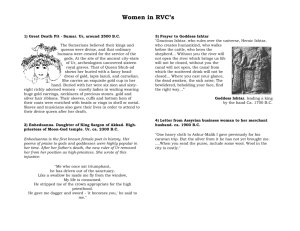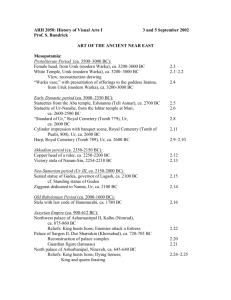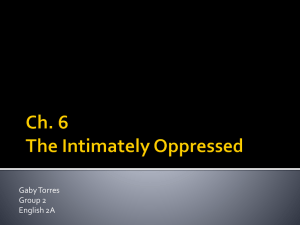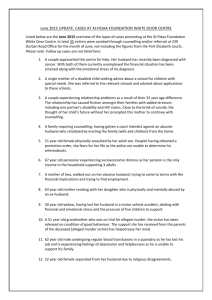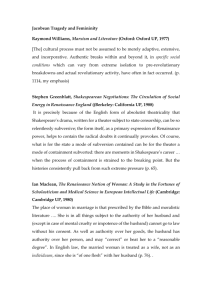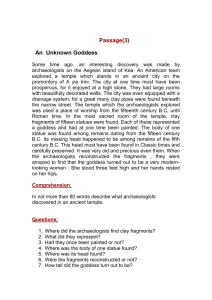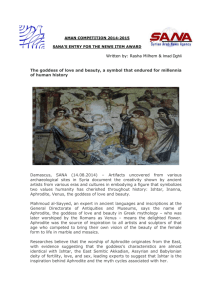Ancient Tablets, Ancient Graves:
advertisement
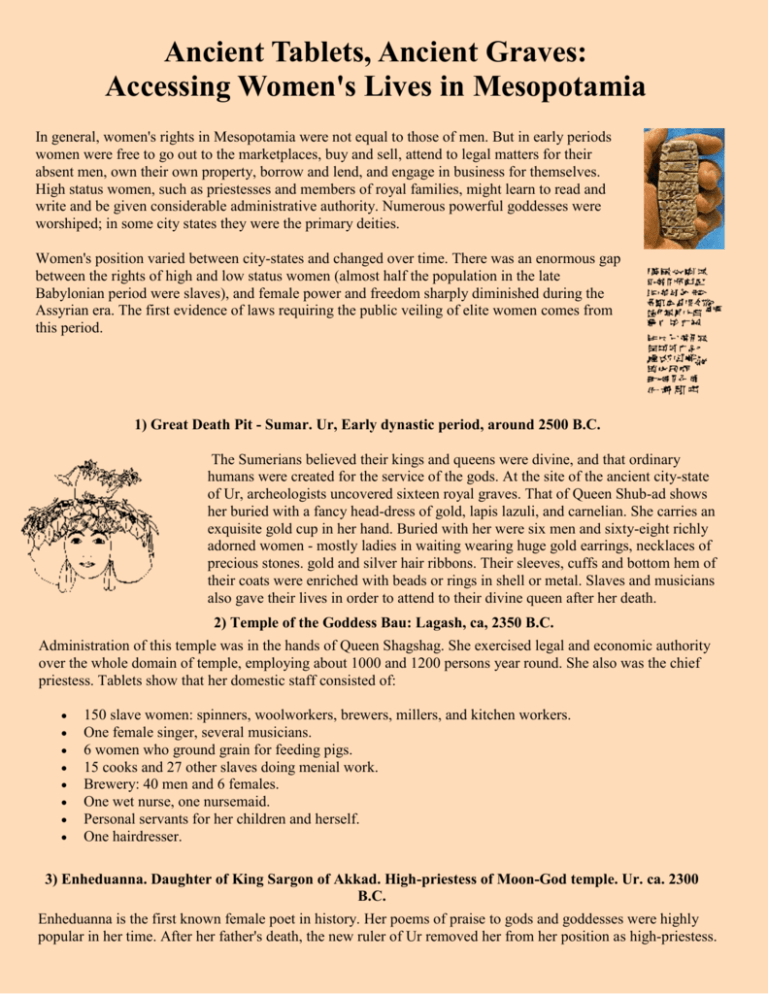
Ancient Tablets, Ancient Graves: Accessing Women's Lives in Mesopotamia In general, women's rights in Mesopotamia were not equal to those of men. But in early periods women were free to go out to the marketplaces, buy and sell, attend to legal matters for their absent men, own their own property, borrow and lend, and engage in business for themselves. High status women, such as priestesses and members of royal families, might learn to read and write and be given considerable administrative authority. Numerous powerful goddesses were worshiped; in some city states they were the primary deities. Women's position varied between city-states and changed over time. There was an enormous gap between the rights of high and low status women (almost half the population in the late Babylonian period were slaves), and female power and freedom sharply diminished during the Assyrian era. The first evidence of laws requiring the public veiling of elite women comes from this period. 1) Great Death Pit - Sumar. Ur, Early dynastic period, around 2500 B.C. The Sumerians believed their kings and queens were divine, and that ordinary humans were created for the service of the gods. At the site of the ancient city-state of Ur, archeologists uncovered sixteen royal graves. That of Queen Shub-ad shows her buried with a fancy head-dress of gold, lapis lazuli, and carnelian. She carries an exquisite gold cup in her hand. Buried with her were six men and sixty-eight richly adorned women - mostly ladies in waiting wearing huge gold earrings, necklaces of precious stones. gold and silver hair ribbons. Their sleeves, cuffs and bottom hem of their coats were enriched with beads or rings in shell or metal. Slaves and musicians also gave their lives in order to attend to their divine queen after her death. 2) Temple of the Goddess Bau: Lagash, ca, 2350 B.C. Administration of this temple was in the hands of Queen Shagshag. She exercised legal and economic authority over the whole domain of temple, employing about 1000 and 1200 persons year round. She also was the chief priestess. Tablets show that her domestic staff consisted of: 150 slave women: spinners, woolworkers, brewers, millers, and kitchen workers. One female singer, several musicians. 6 women who ground grain for feeding pigs. 15 cooks and 27 other slaves doing menial work. Brewery: 40 men and 6 females. One wet nurse, one nursemaid. Personal servants for her children and herself. One hairdresser. 3) Enheduanna. Daughter of King Sargon of Akkad. High-priestess of Moon-God temple. Ur. ca. 2300 B.C. Enheduanna is the first known female poet in history. Her poems of praise to gods and goddesses were highly popular in her time. After her father's death, the new ruler of Ur removed her from her position as high-priestess. She wrote of this injustice: "Me who once sat triumphant, he has driven out of the sanctuary. Like a swallow he made me fly from the window, My life is consumed. He stripped me of the crown appropriate for the high priesthood. He gave me dagger and sword - 'it becomes you,' he said to me." Enheduanna appealed to the goddess Inanna to redress her injuries: "It was in your service that I first entered the holy temple, I, Enheduanna, the highest priestess. I carried the ritual basket, I chanted your praise. Now I have been cast out to the place of lepers. Day comes and the brightness is hidden around me. Shadows cover the light, drape it in sandstorms. My beautiful mouth knows only confusion. Even my sex is dust." 4) Erishti-Aya: Letters to King Zimri-Lim of the city-state of Mari, Akkadian Dynasty 1750 B.C. Zimri-Lim was king of Mari in northern Mesopotamia during the time of Hammurabi. Elite women in Mari held relatively equal status with men. They stood in for the king when he was absent, and ruled in city-states that had been conquered. Zimri-Lim had eight daughters. Two he had become priestesses dedicated to certain gods. They became cloistered, like nuns. One, Erishti-Aya, wrote letters home complaining of her life. "Now the daughters of your house...are receiving their rations of grain, clothing, and good beer. But even though I alone am the woman who prays for you, I am not provisioned... Last year you sent me two female slaves and one of those slaves had to go and die! Now you have brought me two more female slaves and of these one slave had to go and die!" To her mother Erishti-Aya wrote: "I am a king's daughter! You are a king's wife! Even disregarding the tablets with which your husband and you made me entered the cloister, they (the temple officials) treat well soldiers taken as booty. You, then treat me well!"...."My rations of grain and clothing, with which my father keeps me alive, they once gave me, so let them give me them no lest I starve." 5) Prayer to Goddess Ishtar "Gracious Ishtar, who rules over the universe, Heroic Ishtar, who creates humankind, who walks before the cattle, who loves the shepherd... Without you the river will not open the river which brings us life will not be closed, without you the canal will not open, the canal from which the scattered drink will not be closed... Where you cast your glance, the dead awaken, the sick arise; The bewildered, beholding your face, find the right way..."" Goddess Ishtar, leading a king by the hand Ca. 1700 B.C. 6) Letter from Assyrian business woman to her merchant husband. ca. 1900 B.C. "One heavy cloth to Ashur-Malik I gave previously for his caravan trip. But the silver from it he has not yet brought me. ....When you send the purse, include some wool. Wool in the city is costly." 7) Laws in the Hammurabi Code "If a [woman wine-seller] does not accept [grain] according to gross weight in payment of drink, but takes money, and the price of the drink is less than that of the corn, she shall be convicted and thrown into the water." (#108). (This refers to a practice known as a trial by ordeal. It was believed that the Euphrates River would act as judge of people accused of various crimes. If, when thrown into the river, the accused person floated, she or he was considered innocent. But if they sank, the river had found them guilty.) "If conspirators meet in the house of a woman wine-seller, and these conspirators are not captured and delivered to the court, the wine-seller shall be put to death." "If a 'sister of a god' [nun] open a tavern, or enter a tavern to drink, then shall this woman be burned to death." "If a married lady who is dwelling in a man's house sets her face to go out of doors and persists in behaving herself foolishly wasting her house and belittling her husband, they shall convict her and, if her husband then states that he will divorce her, he may divorce her; nothing shall be given to her as her divorce-money on her journey." (Law #141.) "If a married lady is caught lying with another man, they shall bind them and cast them into the water. If her husband wishes to let his wife live, then the king shall let his servant live." (#129)" "If the husband of a married lady has accused her but she is not caught lying with another man, she shall take an oath by the life of a god and return to her house." (#131) "If a man wishes to divorce his first wife who has not borne him sons, he shall give her the amount of her purchase money and the dowry which she brought from her father's house, and let her go." (#138) "If a woman quarrel with her husband, and says: "You are not congenial to me," the reasons for her prejudice must be presented. If she is guiltless, and there is no fault on her part, but he leaves and neglects her, then no guilt attaches to this woman, she shall take her dowry and go back to her father's house." (#142)
